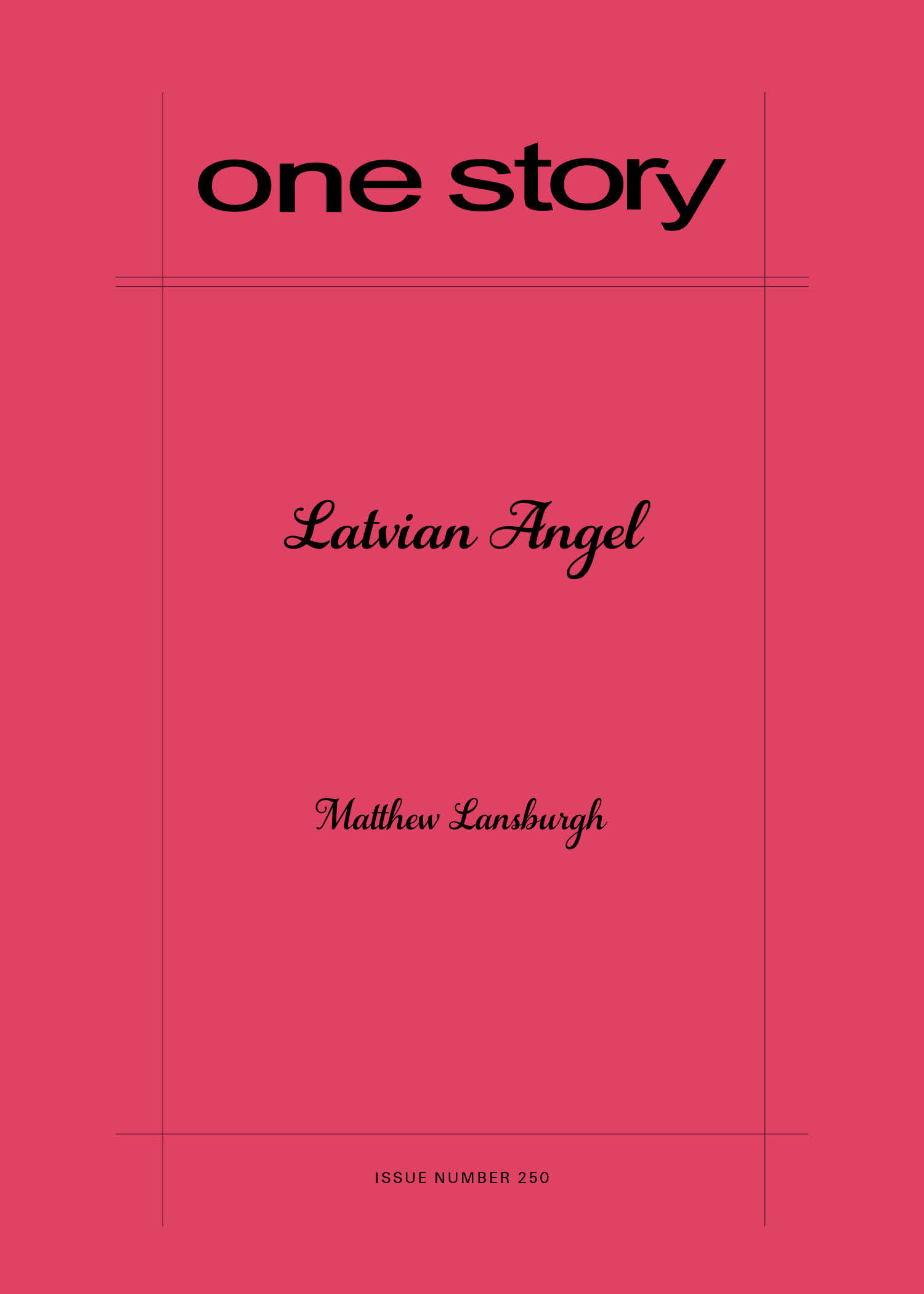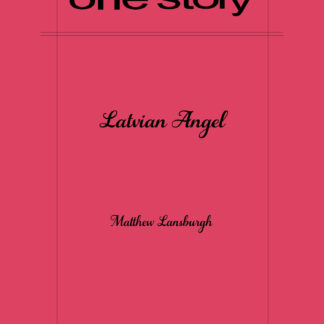
Latvian Angel
$2.50
80 in stock
Excerpt
She’d been what was once called a mail-order bride, a Latvian beauty from a village eighteen kilometers south of Rēzekne, her advertisement indexed under the section of the international periodical titled “Remarkable Women.” Remarkable not because of her thick, blonde hair or outgoing personality, but because of the growths on her back—wings akin to those of a small dove—sprouting from her latissimus dorsi, which, from an early age, had made Klara certain no man would ever find her attractive, despite her mother’s assurances to the contrary. Her mother, a seamstress, had called Klara mans enģelis, my angel, and though some villagers had caught glimpses of the miraculous appendages, most had not.
The year was 1993, just two years after Latvia declared its independence from the Soviet Union, back when few people in Latvia had traveled to the United States, and what was known about life abroad came mostly from magazines and radio shows and, occasionally, TV. Televisions were a luxury few could afford, requiring electricity and enough cash to feed a family of six for more than a year.
America, Klara had heard, was a land of great wealth and infinite opportunity.
Matthew Lansburgh
Matthew Lansburgh’s collection of linked stories, Outside Is the Ocean, won the 2017 Iowa Short Fiction Award and was a finalist for the 30th Annual Lambda Literary Award and the 2018 Ferro-Grumley Award for LGBTQ Fiction. The book’s title story was named a distinguished story in The Best American Short Stories 2018. Matthew’s work has appeared or is forthcoming in publications such as Glimmer Train, Ecotone, Electric Literature, Epoch, StoryQuarterly, Columbia, Guernica, Shenandoah, The Florida Review, Joyland, and Michigan Quarterly Review. You can read more of his work at www.matthewlansburgh.com.
Will Allison on “Latvian Angel”
I’ve always been a sucker for stories in which characters write letters to each other. As a literary device, the epistle is deceptively simple. Letters are a form of first-person narration, allowing characters to bypass a story’s principal narrator and speak for themselves. The catch—the interesting part—is that letter writers tend to be unreliable first-person narrators, misrepresenting themselves in order to influence the letter’s recipient.
The letters in our latest issue, Matthew Lansburgh’s “Latvian Angel,” offer a fun case in point. Klara Ozols is a poor Latvian villager, born with wings on her back, who seeks a better life by advertising herself as a mail-order bride. Ezra Vogel is a lonely Long Island accountant in search of a wife. When Ezra answers Klara’s ad, the two strike up a long-distance correspondence full of cagey spin. Will Klara’s letters convince Ezra that she is the woman of his dreams? Will Ezra’s letters convince Klara that he is the wealthy, handsome, kind suitor he claims to be?
If you’ve read Lansburgh’s terrific debut, Outside Is the Ocean, winner of the Iowa Short Fiction Award, then you know his stories offer up a delicious blend of humor, love, and sexuality, with sympathetic characters often undone by their own wayward desires. “Latvian Angel” is no exception. We’re excited to finally showcase Lansburgh’s first-rate storytelling and sparkling prose in the pages of One Story.
Q&A by Will Allison
- WA: What was the seed of this story? What was the first thing you wrote?
- ML: The story’s protagonist, Klara Ozols, is a character I’ve been thinking about for a long time. She appeared in an early draft of a novel I recently abandoned. Initially, she was a minor character who worked at a Coney Island side show, twirling a baton, showing off her wings, and telling an abbreviated version of her life story. Whenever readers of my work came across Klara on the page, they loved her. Last year, after much hand-wringing and many sleepless nights, I decided I should make her the central character of her own book.
- WA: What was the most challenging aspect of writing this story?
- ML: This story was remarkably easy to write. I’ve written some stories that have gone through literally dozens and dozens of drafts over many years. I got lucky with “Latvian Angel,” however. I wrote it in a week or so last August, and it went through only a handful of drafts. I guess the most challenging aspect of writing it was all of the thinking I had to do about Klara before this story was ready to be told.
- WA: Klara becomes a mail-order bride and is willing to spend her life with a man she doesn’t love in order to pursue the so-called American dream. Can you talk about what drew you to this subject matter?
- ML: The protagonist of my first book, Outside Is the Ocean, is a German immigrant. The story was inspired by my mother, who grew up in Garmisch during World War II. I was raised by my mother as an only child; she was my primary caretaker, and we spent a tremendous amount of time together, so her way of seeing the world shaped a lot of who I am. In writing about Klara, I didn’t intend to write about another complex woman who grew up abroad and emigrated to the United States as an adult, but it appears that’s what I’m doing (though Klara’s background and personality are extremely different from anyone I’ve written about before).
- WA: I love this story’s strong sense of place and the juxtaposition between Where did the idea for this story come fromCan you tell us a little about the titleCan you tell us a little about the title0s New York City and Gramzda, Klara’s small village in Latvia. Do you have a personal connection to Latvia?
- ML: None at all, though I find its history and folklore fascinating. The only things I know about Latvia are based on my research.
- WA: I also love the degree to which life in Gramzda is steeped in superstition, magic, and fantastical genetic diversity, such as Klara’s wings and her sister Tasenka’s tail. Where did this element of the story come from?
- ML: I wish I knew the answer to this question! I guess it came from the part of my heart that has pushed me to be a writer—it’s a place shrouded in mystery and weirdness.
- WA: Despite being a twenty-six-year-old virgin, Klara is no prude. She goes to a porn theater, she sort of likes to be cat-called in Times Square, and she has a robust fantasy life. Can you talk about the role of sexuality in your work?
- ML: I never set out to be someone who writes about sex, but if I’m being honest, I suppose I’d have to admit that a good percentage of my fiction either touches on or explores sex or sexuality (or the opposite of sex: repression). My imagination seems to be drawn to the lascivious and prurient. I guess I find sex fascinating—not so much the act itself, but everything around it; sex informs so much of who we are and how we live, yet it’s a topic most of us don’t feel comfortable discussing openly. In many circles and contexts, it can still feel taboo or forbidden. I’m fascinated by the ways in which we seek it out or avoid it, the lengths we’ll go to pursue it or deny it, and the impact it can have on us—the feelings of guilt and mania and fear it inspires.
- WA: What are you working on now?
- ML: I’m working on the novel I mentioned above. Given the fact that people seem to like “Latvian Angel,” I’ve decided it might make a good opening for a book about Klara and the worlds she encounters in Times Square and Coney Island and the suburbs of Long Island.
- WA: Will there be more sex in the book?
- ML: You bet! There’s gotta be sex. If there’s no sex, there’s really no point.
- WA: What is the best bit of advice about writing you have ever received?
- ML: I’ve been fortunate to work with a lot of wonderful teachers who have given me incredibly helpful advice along the way. At this point, the advice that means the most to me, however, isn’t about crafting a compelling character or writing good dialogue or creating a meaningful arc. The advice that means the most is simply Don’t Give Up. For me, writing is about trial and error, revision, hope and despair. Lather, rinse, repeat.
